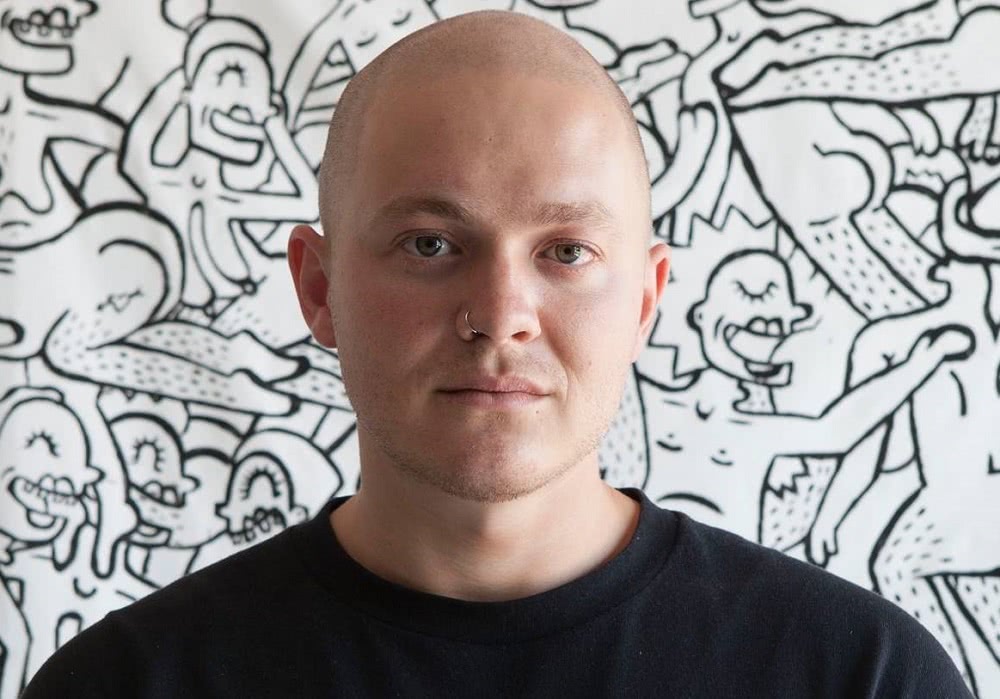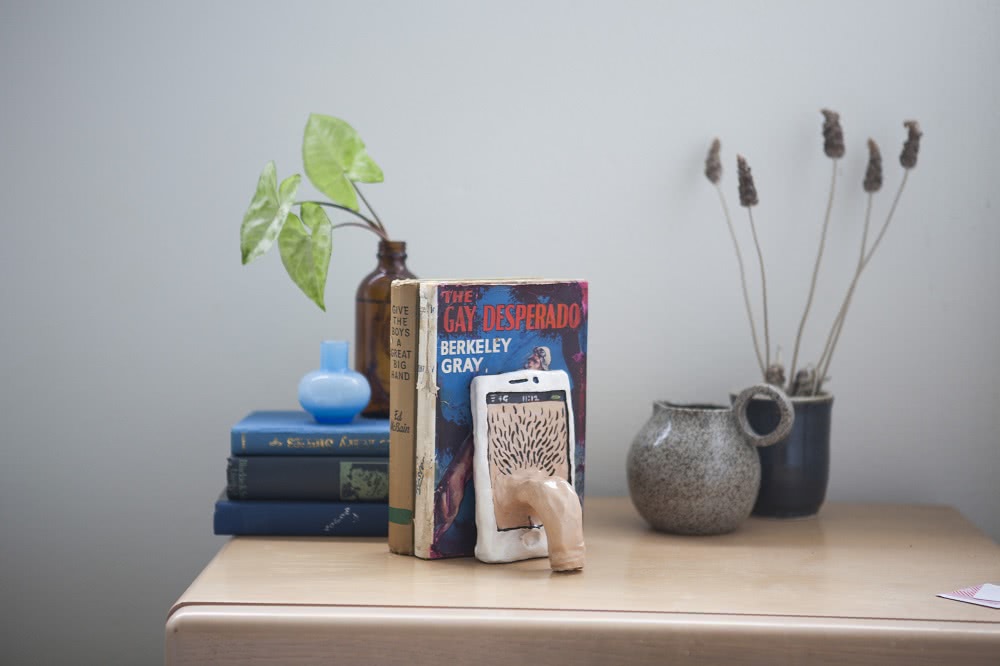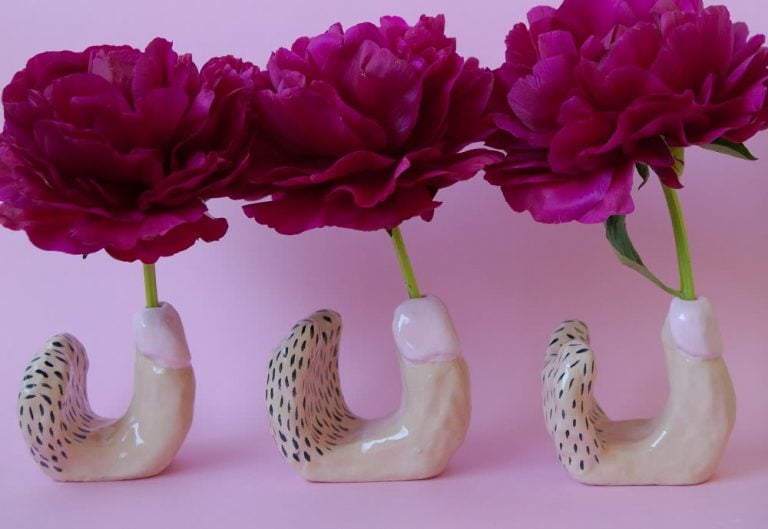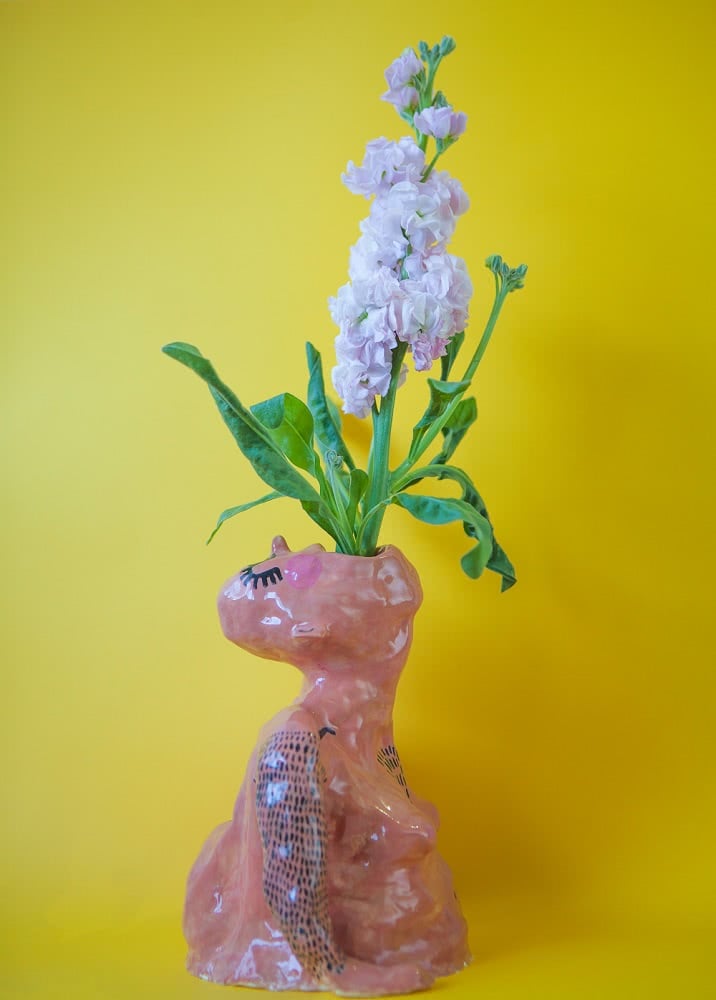For Brisbane-based artist, writer and director Samuel Leighton-Dore, the act of philosophising over sex, gender and sexuality proved essential to his survival throughout his youth.
And now, when he’s not working as a regular contributor for SBS Sexuality, Leighton-Dore can be found painting playful and chaotic orgy murals (one of which was recently taken down by Sydney University after just a day); or carefully crafting cheeky ceramic vases where flowers bloom from the rims of bums and the tips of willies.
A particular artwork of Leighton-Dore’s that’s currently striking a chord is Phrenology Of The Dick, a spoof on the labelled sculptures of the brain that became popular in the late 19th century, when personalities were thought to be biologically predestined and easily identified by the shape of one’s skull. His ceramic penis sculpture is covered in scribbled phrases like “my dad’s was bigger”, “toughen up princess”, and “actual intimacy makes me cry.’”
Watch an interview with Samuel Leighton-Dore here:
Through frequent endearing giggles and a warming earnestness, the jack-of-all-trades discusses his ever-growing oeuvre, how to improve Western culture’s relationship with sex, and what it means to redefine manliness.
This interview has been condensed and edited for clarity.
THE BRAG: Tell me about your most recent work. I read that you’re halfway through your second book, How To Be A Big Strong Man?
Samuel Leighton-Dore: How To Be A Big Strong Man is my way of dealing with my own feelings around masculinity that I’ve carried since childhood. I’m drawing illustrations that challenge the concept of masculinity and broaden the definition by using language that men would be comfortable with.
It was brought on by the fact that, while I previously thought I got bullied as a kid because I was gay, looking back on it I don’t think I would have been bullied if I was gay and more traditionally masculine – I was bullied for not fitting into an idea of what a boy should be. And then there was the conflicting notion that the first people I remember being sexually attracted to were the ones who were bullying me. That’s gotta do some damage deep down somewhere [laughs].
Things get a bit complicated when that happens.
Samuel Leighton-Dore: Yeah. I’m trying to work through those feelings and I’m exploring how complicit I am in these damaging social ideals and what can I do to loosen my own grip on what I feel masculinity should be.
Watch Samuel Leighton-Dore talk through his children’s book, I Think I’m A Poof:
It sounds like a good way of learning where those feelings come from and why you might desire people who hurt you.
Samuel Leighton-Dore: It’s certainly cheaper than therapy [laughs].
Have your artworks had any particularly strong reactions recently?
Samuel Leighton-Dore: Well, I’m using my Phrenology Of The Dick sculptures – which are a nod to those classic psychology sculptures [of the brain] – to break down what fuels a man’s sense of masculinity and using some of my own stories there.
I remember one time I was lining up for a slippery dip at a swimming pool when I was eight and I got an erection – it got pointed at and everyone laughed at me. I associated an erection with negative experience for years after that – and I still do. The end. Erections are bad [laughs].

Samuel Leighton-Dore and his acclaimed, controversial mural
But I think for people who bury stories and bury those negative experiences, it builds up into this well of anger. I’m not sure if you’ve ever had a guy go soft on you during sex, but they can become either really sad or really angry real quick [laughs]. It’s telling that men are so defensive of what they feel represents them as a man, which is so often their dick.
Yeah, I have experienced that. One guy was like, ‘it’s you’, and I was like, ‘I don’t know if it is…’
Samuel Leighton-Dore: Totally! And it’s like, it shouldn’t be an embarrassing thing.
It’s fine!
Samuel Leighton-Dore: It’s totally fine! And of course, none of this is an excuse for awful behaviour, but I do think there’s something to be said for starting a home-team conversation as a man with a dick about why we hold certain aspects of ourselves in such high regard and others in such shame.
I was talking to an academic for another article in this issue about whether people are becoming more closed off towards intimacy; it seems it’s a hard thing to measure.
Samuel Leighton-Dore: Well, it depends on whether you conflate intimacy with sex. I’ve had a lot of very not-intimate sex. Something that I’m very interested in is non-sexual intimacy between men.
Like general closeness and connection?
Samuel Leighton-Dore: Yeah. I think men and boys have been trained from a young age to avoid vulnerability and emotions and closeness, which manifests into this sense of isolation, which you see especially in rural areas. Of course we have our ‘mate’ culture, but it’s so rarely expressed with emotion. It’s very slap-on-the-back as opposed to, ‘how are you going? I’m having a hard time. Wanna spend some time together?’ or by saying, ‘I love you’ to a good friend.

One of the new artworks from Samuel Leighton-Dore, the dick pic bookend
Or by openly crying?
Samuel Leighton-Dore: Yeah, exactly! So I wonder how male behaviour could change if that was something that was unlearnt and we could start being closer.
What do you think are some key changes that our society needs to undergo in order for individuals to have a better relationship towards sex?
Samuel Leighton-Dore: Well, look at social media. We still can’t post photos of female nipples, which is telling of the time we’re living in. And my orgy mural was taken down at Sydney Uni after one day because people found it offensive. It’s all quite predictable stuff.
But it creates this idea that we’re ashamed of our bodies and we’re embarrassed about sex, which I find really interesting. Especially when we’ve all got naked bodies and we’ve always had them – and one thing that connects most people is our sense of sexuality.
I find it really strange that we demonise that. I mean, why aren’t more people going to sex shops? People are having really average sex for years and years and years and are too afraid to talk about it. People will end a relationship before they decide to put any meaningful work into their sex, which I find just bizarre.
So I think really – and this is one thing I like to try to do with my work – we need to just break the ice on that conversation in a way where it doesn’t feel clinical, in a way that’s accessible. I’ve always found it’s easier to start a conversation with a laugh or a smile rather than coming in with statistics and facts. I think a lot of people can find that off putting. I like to put something out there that is at first glace fun, and funny, and understandable.
Yeah, I think the research or the statistics take can be a little alienating sometimes.
Samuel Leighton-Dore: Yeah, totally. You can read stats on someone’s sex life, but that’s not going to inspire you to go out and you buy anal beads [laughs]. You should at least feel comfortable to talk about it and ask questions. And I think that people have every right to watch what their children see, and try and protect them from certain aspects of sexuality, but I think what you see in the evening news is so much more offensive and impactful than the human body. I do think that there needs to be some reshuffling of priorities in the censorship area.
Watch the trailer for a short film by Samuel Leighton-Dore, Showboy:
I sat down with my parents to watch the evening news a while back. It was one disturbing murder case after the next – it was fucked!
Samuel Leighton-Dore: Totally! It’s just like, ‘Here’s a five-year-old girl in Iran and crying bloody faces.’ ‘These kids have just been torn away from their parents, let’s ask them how they’re feeling!’ And this is all normal. It’s such a dose of dismal. I think with that as a touching point, it’s really bizarre that people seem to be so offended by innately positive, creative works that depict sexuality.
It’s just talking about how to have a good root, right?
Samuel Leighton-Dore: Exactly, and that’s really all I care about. That’s what my work boils down to: ‘how to have a good root’ – a Ted Talk.
I watched your interview with Alain de Botton on meme affirmations on love.
Samuel Leighton-Dore: Ugh, I’m obsessed with him. He’s my daddy. He follows me on Twitter, but he never replies. But I think he hears me, so I don’t care. I tell people he’s my mentor [laughs]. We haven’t spoken since the interview. But I do really enjoy his philosophies and his digestible ways of looking at certain aspects of human behaviour for sure.
Watch Samuel Leighton-Dore in conversation with Alain de Botton:
Over the past few years, have you had to re-evaluate how you approach romantic love?
Samuel Leighton-Dore: I’m in a long-term relationship and I’m with my boyfriend Brad, he’s lovely. We’re not in an open relationship, but we definitely have monogamy as a guideline, not a rule, which I think has been really helpful. We can have conversations without jumping down each other’s throat. I’m always re-evaluating and reflecting on sexuality and romantic love. I think we put so much pressure on our partners to be great all the time and to fulfil everything. I always think it’s bizarre when someone breaks up with their partner for cheating. I think an affair should be grounds for a really healthy conversation and that could make a relationship a lot better.
I saw mental health is one of your writing areas.
Samuel Leighton-Dore: Yeah, I’m always depressed so I guess it’s always there. I think because I had such a difficult childhood and so much of that was grounded in my mental health and my sexuality, one is often prodding the other one along.
What do you think has been missing from the current public discourse concerning mental health?
Samuel Leighton-Dore: I mean, if you look at the rates of suicide in men I think there’s definitely still an aspect of mental health that men don’t feel like they can engage with, be it because it’s not masculine or it’s too vulnerable, or x, y, z. I’ve always been too open about it so I don’t relate.
Aside from making treatment more accessible for everyone, I think there probably needs to be a lot more done to remove stigma, especially in remote and rural communities. And working to encourage men and boys to speak up about their depression and anxiety and mental health struggles, because for some reason we think it’s unmanly to do so, but we’re the ones killing ourselves, so…
A lot of men struggle with mental health. And they struggle with violence. Is there a correlation? Men would benefit from talking about their feelings instead of punching them out.
A new piece from Samuel Leighton-Dore, titled ‘Deep Throat Vase’
So, you’re pretty much a jack-of-all-trades. What’s your day-to-day look like and how do you manage creative and mental burnout?
Samuel Leighton-Dore: I get up really early most days. I try and do at least an hour of my own creative work before I start my nine-to-five. Also, you’ll find me at the same corner of the same street every morning on my way to the gym. I am always on a clock. But that’s just because I’m a Cancer. I’m very sensitive and I need some kind of structure.
And I think having a lot of creative outlets helps. I don’t really burn out, but I do get really depressed if I’m not making anything. I really enjoy finding other young creatives, queer creatives from around the world. It’s nice to take a step back and not focus on the gatekeepers, but focus on the people next to me and make stuff with them instead of trying to get people’s approval for larger projects.
What do you think drives you to create art and to write?
Samuel Leighton-Dore:I think there’s a chance for me to amplify certain messages and voices, and to be what I’ve always wanted to see. My straight, female friends were very active during the plebiscite and I felt like they shouldered a lot of the emotional burden of that campaign. A part of me feels driven to do the same thing for women in a way that isn’t taking up their space, but rather helping to shoulder some of that.
If I could have a girl friend open up Facebook when she’s feeling really shit about the way men have treated her and the way men are in the media and you know, someone has just vandalised a memorial and all this shit’s happening… If I can put a picture up and acknowledge, admit and address the fact that men have a misguided idea of what makes them sexy or strong then I’d like to think that’s in a very small way helping to create a mood of change.
You can buy the art of Samuel Leighton-Dore on his website, here. For more content from the BRAG’s Sex issue, read this review of pornographic classics.


































